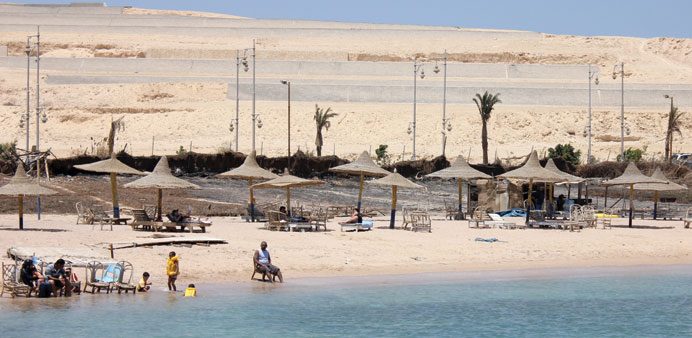Even free-of-charge public beaches like this one are only thinly patronised on Egypt’s Red Sea coast at Hurghada these days.
By Nehal El-Sherif
“Come take a look now, then you can buy tomorrow,” says a young man as he tries to lure tourists to visit his clothes shop in the Red Sea resort city of Hurghada in Egypt.
Saber, like many others, moved from southern Egypt to work in the tourist city. But his business has slowed down in the past two years.
The walkway known as al-Mamsha is filled with shops, cafes and restaurants, where many visitors spend the nighttime. But these days, it is often almost empty.
Saber gets disappointed when tourists do not accept his invitation, but he keeps standing outside his shop waiting for the next group he spots from afar.
Tourism was a key pillar of Egypt’s economy before the popular uprising that forced Hosni Mubarak to resign in 2011. It generated some $12.5bn in 2010. This figure fell by 30% to $8.8bn the following year.
However, Prime Minister Hesham Qandil was optimistic when he visited the city in May to inaugurate several new projects. He said that tourist traffic has increased by 17% so far in 2013 compared to 2011. Tourism, Qandil said, provides 11% of the gross domestic product (GDP) of the country.
According to the latest statistics from the UN World Tourism Organisation (UNWTO), Egypt jumped five places in 2012 to rank as the 22nd destination in the order of international tourist arrivals. The UNWTO said that Egypt is also one of the emerging markets to experience rapid growth by another measure, international tourism expenditure, climbing three spots to reach 49th place.
Hurghada is one of Egypt’s main resort cities. On the coast of the Red Sea, it is famous for its diving and snorkelling spots. As officials stress, the sector is regaining its strength.
Some people in the hotel business say occupancy rates rose to 60% in May. However, this percentage was not evident on the almost-empty beaches and at the poolsides.
Workers in hotels said the city remains the first destination in Egypt for Russians. Almost all Egyptians working in Hurghada have learned Russian, and shops always display their names and details in Russian.
Ahmed, a receptionist in a five-star hotel, speaks Russian, German, English and some Polish. He learnt them all after he started working in the tourism business in Hurghada. “Almost 70% of the guests here are Russian, followed by the Germans,” he said.
According to government figures, the number of Russian tourists in Egypt in 2012 reached 2.5mn, out of a total of 11.5mn visitors. “But most of those who visit remain fearful of leaving the hotel or walking around in the city,” Ahmed added.
Since Mubarak’s ouster, deadly clashes have often erupted in different parts of the country. Crime rates have soared, and moreover, there have been increasing abductions of tourists — especially in the Sinai peninsula — by Bedouins or jihadists hoping to pressure the government into releasing their relatives from prisons.
The government recently installed a 14-mn-Egyptian-pound ($2mn) security camera system in Hurghada. Its recorded data can be used to fight crime.
“The cameras will help us very much to catch perpetrators. The main problem in Hurghada was that tourists filed complaints then left the country. So, each case was closed. But now, we can get culprits on camera and will not need tourists to follow up the case. We will have evidence,” Qandil said.
Ali Reda, the head of the Red Sea Investors Association, hailed the new security system as the first step to control problems in the resort city. “In the past, there was no crime in Hurghada, but there was no development either,” he said.
“Here, we are almost an independent area, we do not have the problems Cairo faces. But we also want people to feel more safe to be able to work,” added Reda.
Reda reflected the frustration expressed by some investors in the province. He complained of infrastructure problems, higher prices and the lack of diesel in the city.
He said power consumption by resorts is a load on the city’s cables. He demanded a separate infrastructure for hotels. “The power cuts are affecting everything, from refrigerators to generators. It also upsets the tourists,” he said.
Egypt suffered from power cuts even before the 2011 uprising. In the summer, cities are hit by daily blackouts, with successive governments blaming the problem on higher consumption.
“Prices of internal flight tickets are high, thus preventing a large sector of Egyptians from coming to the city. Sometimes, it would be cheaper for me to go to Beirut. We also want more diesel supplies. If we ran out of diesel, we will be totally paralysed,” Reda added.
“Guests cannot bear our problems.”
In January, the government said it would start pumping natural gas to more than 50 resorts in the Hurghada area, where hotels depend on diesel fuel to produce electricity through privately owned generators.
In a bid to reassure investors, Minister of Tourism Hesham Zazou said the ministry was planning to introduce Intelligent Lighting and Solar Water Heating systems in hotels to help save energy. However, one shop owner is not optimistic.
“The summer months mean longer periods spent in the dark and the heat, and less visitors to my shop,” he says.
Reda is hoping his pleas do not fall on deaf ears, by promising to support the government in the post-revolution transitional period.
“Let us get back on our feet first, then we will do what it takes to help the country move forward,” added Reda. — DPA
1 Two women tourists keep their distance as they look at the goods in one of the shopping areas in Hurghada city. The shopkeeper remains seated outside his store. Business owners have expressed frustration at the slow pace of tourism’s recovery in the Egyptian Red Sea resort.
2 Hurghada by night. Photograph: Aligatorek

